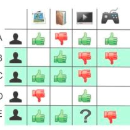Recommendation models can effectively estimate underlying user interests and predict one's future behaviors by factorizing an observed user-item rating matrix into products of two sets of latent factors. However, the user-specific embedding factors can only be learned in a transductive way, making it difficult to handle new users on-the-fly. In this paper, we propose an inductive collaborative filtering framework that contains two representation models. The first model follows conventional matrix factorization which factorizes a group of key users' rating matrix to obtain meta latents. The second model resorts to attention-based structure learning that estimates hidden relations from query to key users and learns to leverage meta latents to inductively compute embeddings for query users via neural message passing. Our model enables inductive representation learning for users and meanwhile guarantees equivalent representation capacity as matrix factorization. Experiments demonstrate that our model achieves promising results for recommendation on few-shot users with limited training ratings and new unseen users which are commonly encountered in open-world recommender systems.
翻译:建议模式可以将观察到的用户项目评级矩阵纳入两组潜在因素的产品中,从而有效估计用户的基本兴趣并预测个人的未来行为。然而,用户特有的嵌入因素只能以传输方式学习,从而难以在现场处理新的用户。在本文件中,我们提议了一个包含两种代表模式的引导式协作过滤框架。第一个模式遵循常规矩阵化,将一组关键用户的评级矩阵化,以获取元潜。第二个模式采用基于关注的结构学习,根据这种结构来估计从查询到关键用户之间的隐藏关系,并学习利用元潜层通过传来传递神经信息,为查询用户进行感化嵌入。我们的模型使用户能够进行感应式代表学习,同时保证作为矩阵因子化的同等代表能力。实验表明,我们的模型为在开放世界推荐系统中通常遇到的、培训评级有限的少数用户和新的隐性用户提供的建议,取得了很有希望的结果。




